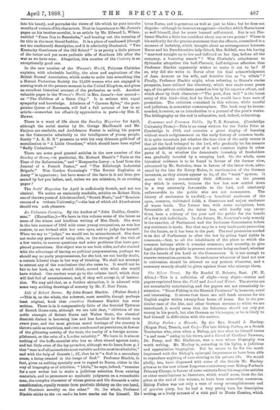Commons and Common Fields. By T. E. &mutton. (Cambridge University
Press.)—This is an essay written for the Yorke Prize at Cambridge in 1886, and contains a great display of learning without much enlightenment on the early history of common lands. It is quite uncertain yet whether the true view of the early manor is that all the land belonged to the lord, who gradually let his tenants acquire individual rights to part of it and common rights in other parts of it, or whether the democratic township of freeholders was gradually invaded by a usurping lord. On the whole, more historical evidence is to be found in favour of the former view, advocated by Mr. Seebohm, than in favour of the latter view, advo- cated by the late Sir Henry Maine, in continuation of the German inventors, as they almost appear to be, of the " mark " system. It seems to make uncommonly little difference at the present day which is correct, because the law has now settled down in a way extremely favourable to the lord, and absolutely unfavourable to the public who are not commoners. The history of enclosures is twofold,—a beneficial enclosure of the open, common, cultivated fields, a disastrous and unjust enclosure of waste lands. The former has, with some exceptions, been favourable all round ; the latter has, with hardly any excep- tions, been a robbery of the poor and the public for the benefit of a few rich individuals. In the future, Mr. Scratton's only remedy is the sanction of Parliament and the Inclosure Commission before any enclosure is made. But that may be a very inadequate protection for the future, as it has been in the past. The real protection needed is an Act of Parliament to alter the law by giving legal rights in commons,—first, to all the inhabitants of the place to which the common belongs while it remains common ; and secondly, to give legal rights to the public to prevent commons being enclosed, whether for the benefit of the Lord or the Commoners. It is not enough to reserve recreation-grounds. No enclosures whatever of land not now in cultivation should be allowed on any pretext whatever, and a summary remedy should be given against those who attempt them.


































 Previous page
Previous page